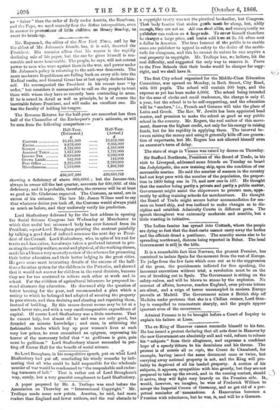The et-King of Hanover cannot reconcile himself to his fate.
He has issued a protest declaring that all acts done in Hanover by the new Government are absolutely null and void, refuses to release his " subjects " from their allegiance, and expresses a confident hope of a speed3ritturn to his dominions and his throne. The protest is of coarse all en rbgle, the Count de Chambord, for example, having issued the same document once or twice, but carrying away national property is not, and the King will pro- bably be deprived of all his landed property. A section of his subjects, it appears, sympathize with him greatly, but they are not prepared to take up the sword, and in the coming contest, should it arrive, they will fight very bravely on the Prussian side. It, would, however, we imagine, be wise of Frederick William to accept the Imperial Crown of Germany, and so get rid of a per- petual reminder of annexations. A Hanoverian becomes a Prussian with reluctance, but he was, is, and will be a German.






























 Previous page
Previous page